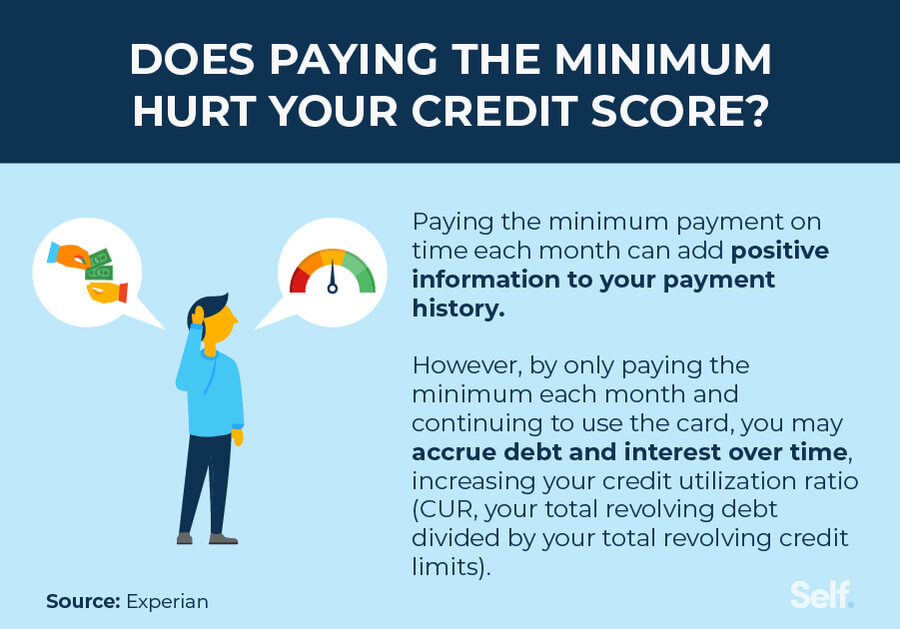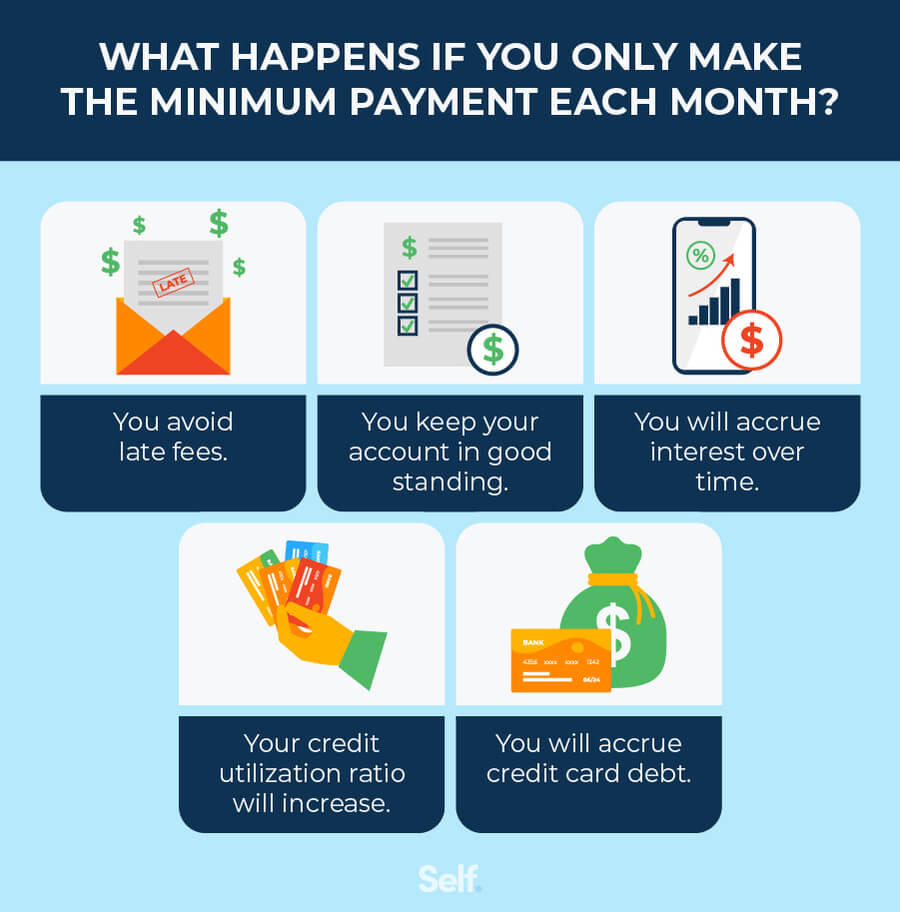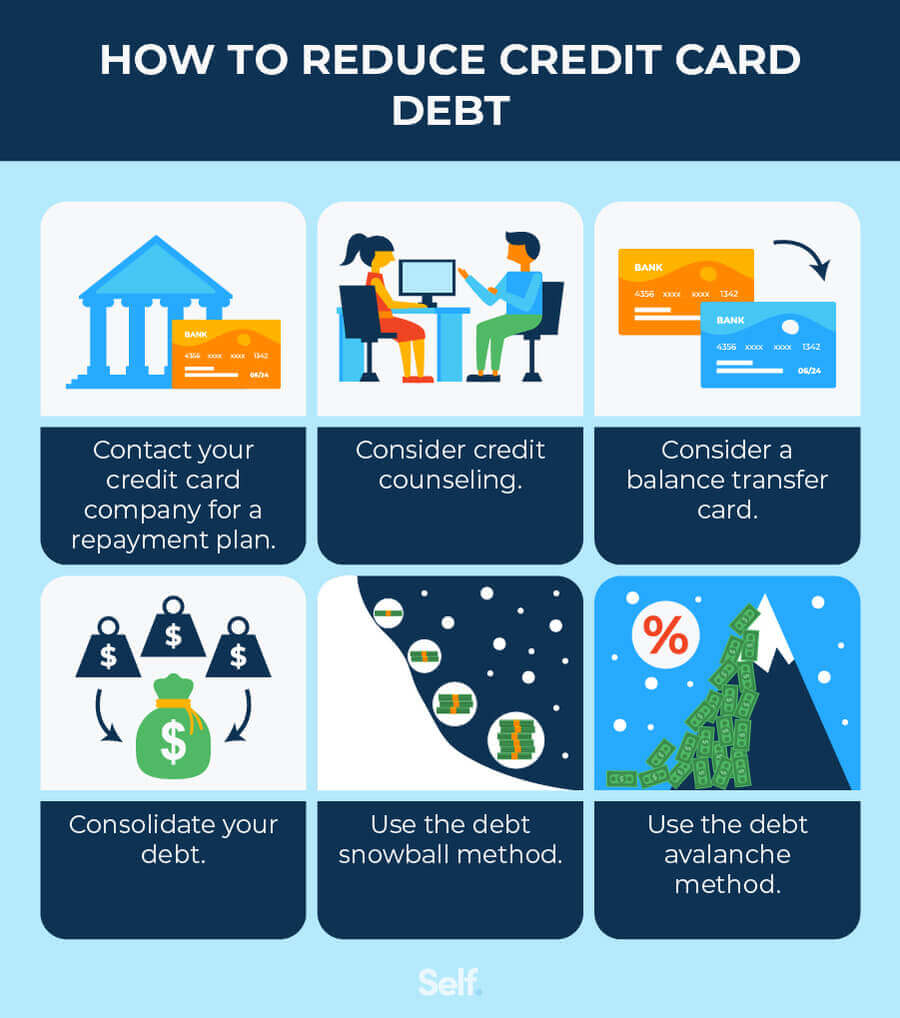Does Paying the Minimum Hurt Your Credit Score?
Published on: 05/02/2023
Paying the minimum payment on your credit card balance on time each month can have a positive impact on your credit score — it helps you build positive payment history, and it’s definitely better than a missed or late payment. However, it has the potential to hurt your credit, too. If you continue to use your card and interest accrues, your credit utilization ratio (CUR, your total revolving debt divided by your total revolving credit limits) may increase, which could affect your credit.[1]
In this guide, we go over how paying the minimum credit card payment impacts your credit score, what happens if you only pay the minimum amount and strategies to avoid credit card debt.
Table of contents
- What is a minimum payment?
- Does making minimum payments impact your credit score?
- Should you pay the minimum payment on a credit card?
- What happens if you only pay the minimum amount?
- How to reduce credit card debt
- Learn how to get a free credit report
What is a minimum payment?
A minimum monthly payment is the lowest amount of your credit card balance that your credit card issuer will accept as payment to keep your account in good standing, meaning you pay your credit card account as agreed. Paying the minimum amount also helps you avoid late fees, as long as you pay as agreed per your cardholder agreement and make the payment on time.[2]
You’ll often see two other terms used along with minimum payment: statement balance and current balance.[3] Your statement balance refers to the amount you owe at the end of your billing cycle, while your current balance is the amount you owe at a given point in time, which may not reflect pending charges or payments. Your minimum payment is calculated from your statement balance, and you’ll find it on your monthly credit card statement.
Minimum payments give cardholders extra time to pay off their remaining credit card bill. But only making minimum payments can make it harder to manage your outstanding balance, because you accrue interest charges on the unpaid debt you carry over.[3]
Does making minimum payments impact your credit score?
Yes, paying the minimum payment on your credit card by the payment due date will positively affect your payment history, the most important factor in calculating your FICO® Score.[4] However, it may negatively affect your credit score if you end up with a high credit utilization ratio (CUR).[1]

Your credit utilization ratio is calculated by taking your total revolving debt and dividing it by your total revolving credit limits. It impacts your amounts owed, a factor that makes up 30% of your FICO® credit score. While you should keep your CUR below 30%, for the most positive impact on your credit, experts suggest maintaining a CUR under 10%.[5]
At the end of your monthly billing cycle, most lenders typically report your balance to the three major credit bureaus, Experian, Equifax and TransUnion.[1] If you’re only paying the minimum amount due each month, you may not make much of a dent in your total balance. This may keep your overall revolving debt high compared to your overall credit limit, which could lower your credit score.
Of course, paying less than the minimum payment or missing a payment will negatively impact your credit score. Missed or late payments, which include paying less than what you owe, would impact your payment history, the most important credit score factor.[6]
Should you pay the minimum payment on a credit card?
If you’re able to do it, paying off your full balance on time each month is better than paying the minimum payment. Doing this helps you avoid interest charges that can accumulate.
In addition to saving you money on interest, paying more than your minimum also helps you keep a lower credit utilization ratio, which may improve your credit score.[7]
If you need extra cash on hand and can only afford to pay the minimum payment amount, it’s better to do that than miss or be late on a payment. It helps you avoid late payment fees and keeps your account in good standing, meaning you’ve made on-time payments and satisfied the terms of your cardholder agreement.[8] In addition, your credit history will report positive payments by at least making the minimum payment on time.[4]
What happens if you only pay the minimum amount?
Paying only the minimum amount on your credit card bill can have both positive and negative effects on your credit. Here are some of the most common ones.

Paying the minimum avoids late fees and builds payment history
Paying the minimum payment can help you avoid costly late fees.[8] By making the minimum payment each month by your due date, you’re also building a history of on-time payments. Payment history is the biggest factor in your credit score, making up 35% of your FICO® Score, so making your payments on time is essential to establishing good credit.[4]
Paying the minimum keeps your account in good standing
Making minimum payments each month keeps your account in good standing with your card issuer, which means you’re making payments as agreed. Credit accounts in good standing have a positive impact on your credit score and credit report.[9]
Paying the minimum may lead to interest accumulation
While you won’t be charged a late fee or penalty for an on-time minimum payment, you will carry over your unpaid balance and be charged interest on it until it’s paid in full.
If you carry an ongoing monthly balance and only make minimum payments, you’ll continue to be charged interest that keeps accumulating until your balance is paid off. So, as your balance continues to accumulate, the amount of interest you’re charged increases, too.[1]
Paying the minimum may not lower your credit utilization ratio
Making only the minimum payment on your credit card bill might not have much impact on your credit utilization ratio. A high CUR may signal to lenders that you need credit to manage your monthly obligations. Your CUR affects your amounts owed, another important factor in your credit score.[10]
Paying your minimum payment does take care of some part of your debt, but, depending on how much you spend, it might not make a big impact on your total debt because of interest charges and any new spending, if you continue to make purchases with your credit card. Generally, the higher your total debt and CUR are, the more negative the impact on your credit score is.[1]
Paying the minimum can keep you in credit card debt
Paying just the minimum extends the amount of time you have to pay off your debt if you’re unable to pay the full balance. This can keep you in debt, especially as your balance keeps increasing from additional purchases and interest charges.[6]
According to the Credit CARD Act of 2009, credit card issuers are legally required to include a “minimum payment warning” on each credit card billing statement. The warning discloses the amount of time it would take to pay off your total debt if you only paid the minimum amount. To get an idea of how this might affect you, look for the disclosure on your next credit card statement.[11]
How to reduce credit card debt
Tackling your credit card debt might seem like an impossible task, but you can try these strategies to pay it down:

- Contact your credit card company for a repayment plan. If you’re struggling to pay your balance, reach out to your credit card company. You may be able to work with them directly to develop a more manageable repayment plan. Some credit card companies even have hardship programs that provide debt relief to consumers under certain circumstances.[12]
- Consider credit counseling. Credit counseling gives you another perspective on your personal finances that could help guide you out of debt. A credit counselor might also be able to negotiate with your current creditors to help reduce your late fees or interest rates by setting you up on a debt management plan.[12]
- Consider a balance transfer card. By transferring your existing credit card balance onto a new card with low or no interest, you can save money while giving yourself more time to pay your debt. However, the 0% APR you’d get on a balance transfer card is usually an introductory rate, and may not last more than a year, and you may be charged a balance transfer fee as well. Be sure that the card is right for you in the long run before you make the transfer.[13]
- Consolidate your debt. By combining your debts across various accounts into a single personal loan or home equity loan, debt consolidation can help make debt more manageable. While you aren’t guaranteed to qualify for a lower interest rate, you may avoid late fees by having just one convenient payment rather than several to manage. However, if you’re struggling with your finances, be careful not to take unsecured credit card debt and secure with your home.[14]
- Use the debt snowball method. The debt snowball method is a repayment strategy that uses the accomplishment of paying off accounts to motivate you. Usually, you work on paying off your smallest debts first, working your way up to the larger ones.
- Use the debt avalanche method. The debt avalanche method is a repayment strategy that focuses on paying off your most expensive debt first. That usually means you prioritize the biggest source of debt, meaning the account with the highest interest rate. Once that’s paid, you focus on paying down the next-biggest source of debt, working your way down.
Learn how to get a free credit report
You can get a free credit report once a year from each of the major credit bureaus, by contacting the bureaus directly or online through AnnualCreditReport.com. Because of the COVID pandemic, the three major credit reporting bureaus (Experian, Equifax and TransUnion) continue to offer free credit reports weekly through the end of 2023. Experian allows a free credit score as well.[15] Some credit card issuers and financial institutions also offer credit-monitoring tools through FICO®, so you may be able to access your credit score through your existing accounts.
If you’re making the minimum payment on your credit card each month, you’ve already started a good financial habit. But paying off more of your balance where and when you can brings your debt down even more.
If you need help tackling your debt or managing your personal finances, Self has you covered. Whether you’re focused on rebuilding credit or are just starting out, we have tools and resources to help you work toward a better financial future.
Disclaimer: FICO is a registered trademark of Fair Isaac Corporation in the United States and other countries.
Sources
- Experian. “What Happens if You Only Pay the Minimum on Your Credit Card?” https://www.experian.com/blogs/ask-experian/what-happens-if-you-only-pay-the-minimum-amount-due/. Accessed January 20, 2023.
- Consumer Financial Protection Bureau. “Financial Terms Glossary,” https://www.consumerfinance.gov/consumer-tools/educator-tools/youth-financial-education/glossary/#M. Accessed January 20, 2023.
- Experian. “Credit Card Balance and Statement Balance: What’s the Difference?” https://www.experian.com/blogs/ask-experian/current-balance-vs-statement-balance/. Accessed January 20, 2023.
- myFICO®. “How Payment History Impacts Your Credit Score,” https://www.myfico.com/credit-education/credit-scores/payment-history. Accessed January 20, 2023.
- myFICO®. “What Should My Credit Utilization Ratio Be?” https://www.myfico.com/credit-education/blog/credit-utilization-be. Accessed January 20, 2023.
- CNBC. “Making only minimum payments on credit card debt could cost you thousands and take over a decade to repay,” https://www.cnbc.com/select/why-to-avoid-minimum-credit-card-payments/. Accessed January 20, 2023.
- TransUnion. “Paying the Balance vs. Paying the Minimum on a Credit Card,” https://www.transunion.com/blog/debt-management/credit-card-101-paying-the-balance-vs-paying-the-minimum. Accessed January 20, 2023.
- Forbes. “What Happens To Your Balance And Credit Score When You Pay Only The Minimum On Your Credit Card?” https://www.forbes.com/advisor/credit-cards/what-happens-to-your-balance-and-credit-score-when-you-pay-only-the-minimum-on-your-credit-card/. Accessed January 20, 2023.
- CardRates. “What Does It Mean For a Credit Card to Be in Good Standing?” https://www.cardrates.com/advice/credit-card-in-good-standing/. Accessed January 20, 2023.
- myFICO®. “How Owing Money Can Impact Your Credit Score,” https://www.myfico.com/credit-education/credit-scores/amount-of-debt. Accessed January 20, 2023.
- Federal Trade Commission. “Credit Card Accountability Responsibility and Disclosure Act of 2009,” https://www.ftc.gov/sites/default/files/documents/statutes/credit-card-accountability-responsibility-and-disclosure-act-2009-credit-card-act/credit-card-pub-l-111-24_0.pdf. Accessed January 20, 2023.
- Federal Trade Commission. “Settling Credit Card Debt,” https://consumer.ftc.gov/articles/settling-credit-card-debt. Accessed January 20, 2023.
- Experian. “What Is a Balance Transfer and How Does It Work?” https://www.experian.com/blogs/ask-experian/what-is-a-balance-transfer-and-how-does-it-work/. Accessed January 20, 2023.
- Consumer Financial Protection Bureau. “What do I need to know about consolidating my credit card debt?” https://www.consumerfinance.gov/ask-cfpb/what-do-i-need-to-know-if-im-thinking-about-consolidating-my-credit-card-debt-en-1861/. Accessed January 20, 2023.
- Consumer Financial Protection Bureau. “How do I get a copy of my credit reports?” https://www.consumerfinance.gov/ask-cfpb/how-do-i-get-a-copy-of-my-credit-reports-en-5/. Accessed January 20, 2023.
About the author
Ana Gonzalez-Ribeiro, MBA, AFC® is an Accredited Financial Counselor® and a Bilingual Personal Finance Writer and Educator dedicated to helping populations that need financial literacy and counseling. Her informative articles have been published in various news outlets and websites including Huffington Post, Fidelity, Fox Business News, MSN and Yahoo Finance. She also founded the personal financial and motivational site www.AcetheJourney.com and translated into Spanish the book, Financial Advice for Blue Collar America by Kathryn B. Hauer, CFP. Ana teaches Spanish or English personal finance courses on behalf of the W!SE (Working In Support of Education) program has taught workshops for nonprofits in NYC.
Editorial policy
Our goal at Self is to provide readers with current and unbiased information on credit, financial health, and related topics. This content is based on research and other related articles from trusted sources. All content at Self is written by experienced contributors in the finance industry and reviewed by an accredited person(s).
